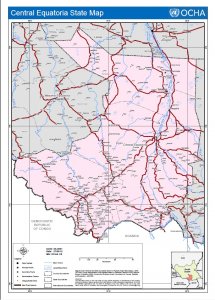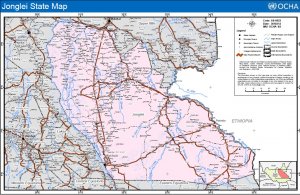The sixth session of Phase II of the IGAD-led multi-stakeholder peace negotiations officially opened on 22 September and adjourned on 5 October 2014. Participants included representatives of the Government of South Sudan, the SPLM in Opposition, the SPLM Leaders (former detainees), civil society organizations and faith-based organizations. Progress has been made in this round of talks, as the participants have some agreement on the structure and functions of the Transitional Government of National Unity (TGoNU) as well as the principle of a federal system of governance. Yet the pernicious deadlocks of the previous sessions continued in this last round.
Despite the progress made on aspects of the proposed TGoNU, the negotiations are not continuing at the expected pace. Both the 60-day deadline set on 11 June and the new 45-day deadlineset on 25 August to establish the TGoNU have expired and remain unmet. Expected to resume on 16 October, the peace talks have also been postponed to 27 October.
Delays in the talks emerged from impasses regarding elements of the TGoNU. The parties disagreed on the extent of the Prime Minister’s executive powers relative to that of the President. The opposition argued that the Prime Minister be given full executive powers, yet the government maintained that this would relegate the President to a ceremonial role. Furthermore, the Government accused the SPLMiO of stalling the talks and not compromising. The SPLMiO has denied these allegations, stating that they are willing to negotiate on power-sharing. Other contentious issues included the length of the transition period, the details of the post-transition period, and form of federalism.
The role of IGAD remains contentious. The Government has urged for moving the talks from Ethiopia to Kenya, claiming that the Chairman of the IGAD Mediation Process, Ambassador Seyoum Mesfin, is inexperienced and that his Kenyan junior would be more competent.
Not unlike the previous round of negotiations, this session has been perceived as lacking inclusivity. The Political Parties Leadership Forum (PPLF), entitled to participate in the negotiations, washindered from travelling. Moreover, the government’s controversial National Security Bill creates uncertainty among opposition parties regarding their freedom of expression and opportunity to participate in South Sudanese politics.
The parties were initially optimistic about the prospects for peace during this round of talks, but fighting continues. Both parties have failed to implement the Cessation of Hostilities (CoH) Agreement of 23 January despite recommitment both in May and most recently in August. The Government in Juba blames the SPLMiO for the recent flare up of the conflict while also criticising IGAD for not publicly condemning the alleged culprits. The SPLMiO denied the allegations and stated that their troops responded to attacks initiated by government forces and Ugandan troops.
Uganda’s new military cooperation with South Sudan is condemned by the SPLM-Leaders who see it as a tactic to delay the conflictand as a means to strengthen the government’s military campaign against the SPLMiO. Moreover, SPLMiO, which consistently decried the neighbouring country’s involvement in the civil war, have reportedly killed two Ugandan soldiers in the most recent clashes.
Frustrated, the international community has responded in two diametrically opposed ways. Firstly, the Chama Cha Mapinduzi (CCM), the ruling party in Tanzania, arranged a supplementary confidence building event in Arusha. The party hosted the three main factions of the SPLM with the aim of unifying the movement through studying lessons learned from other liberation movements that have experienced similar conflicts.
Secondly, the United States has taken a firmer stance on the conflict. While IGAD member countries have yet to reach agreement regarding punitive sanctions, the US’s special envoy Donald Booth has intimated that the country would be willing to extend sanctions on additional South Sudanese officials if negotiations continue to dither. Similarly, US Ambassador to the UN, Samantha Powers, warned that unless the stakeholders take the talks more seriously and embrace a spirit of compromise, they would be in danger of UN Security Council sanctions.
The lethargic pace of the peace process is foremost a consequence of the parties’ belief that victory can be obtained on the battlefield. The politics surrounding the inclusion of opposition parties in IGAD negotiations and the opening of another forum in Arusha inadvertently allows both sides to procrastinate over peace-making while pursuing the military option. The parties are however locked in a conflict neither can win: the SPLMiO cannot take power by force as long as Uganda maintains its military support to the government and oil revenues continue to flow into the state’s coffers, but the government is not strong enough to flush out the rebels. It remains to be seen when a window of opportunity for actual peace talks will open amidst the delays and deadlocks.
Sebabatso Manoeli, PhD student, University of Oxford and Øystein H. Rolandsen, senior researcher PRIO.

